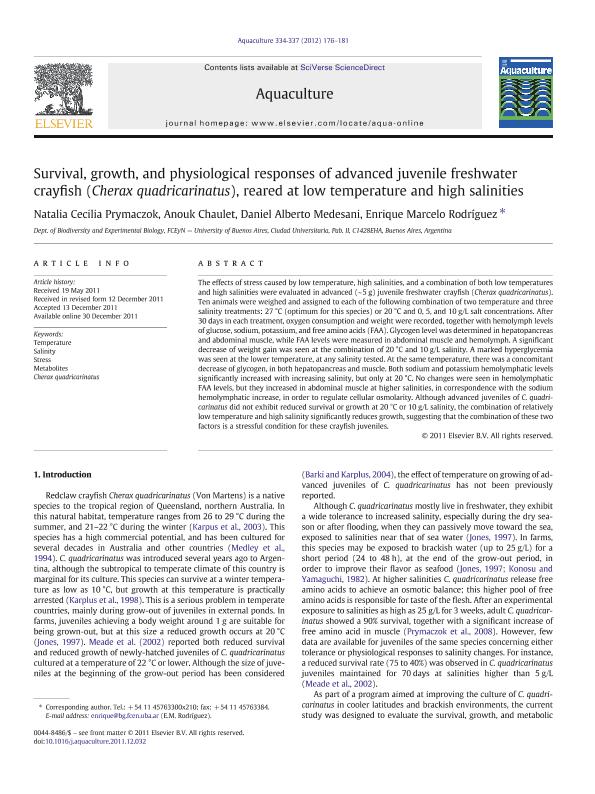Artículo
Survival, growth, and physiological responses of advanced juvenile freshwater crayfish (Cherax quadricarinatus), reared at low temperature and high salinities
Fecha de publicación:
03/2012
Editorial:
Elsevier Science
Revista:
Aquaculture
ISSN:
0044-8486
Idioma:
Inglés
Tipo de recurso:
Artículo publicado
Clasificación temática:
Resumen
The effects of stress caused by low temperature, high salinities, and a combination of both low temperatures and high salinities were evaluated in advanced (~. 5. g) juvenile freshwater crayfish (Cherax quadricarinatus). Ten animals were weighed and assigned to each of the following combination of two temperature and three salinity treatments: 27 °C (optimum for this species) or 20 °C and 0, 5, and 10. g/L salt concentrations. After 30. days in each treatment, oxygen consumption and weight were recorded, together with hemolymph levels of glucose, sodium, potassium, and free amino acids (FAA). Glycogen level was determined in hepatopancreas and abdominal muscle, while FAA levels were measured in abdominal muscle and hemolymph. A significant decrease of weight gain was seen at the combination of 20 °C and 10. g/L salinity. A marked hyperglycemia was seen at the lower temperature, at any salinity tested. At the same temperature, there was a concomitant decrease of glycogen, in both hepatopancreas and muscle. Both sodium and potassium hemolymphatic levels significantly increased with increasing salinity, but only at 20 °C. No changes were seen in hemolymphatic FAA levels, but they increased in abdominal muscle at higher salinities, in correspondence with the sodium hemolymphatic increase, in order to regulate cellular osmolarity. Although advanced juveniles of C. quadricarinatus did not exhibit reduced survival or growth at 20 °C or 10. g/L salinity, the combination of relatively low temperature and high salinity significantly reduces growth, suggesting that the combination of these two factors is a stressful condition for these crayfish juveniles.
Palabras clave:
CHERAX QUADRICARINATUS
,
METABOLITES
,
SALINITY
,
STRESS
,
TEMPERATURE
Archivos asociados
Licencia
Identificadores
Colecciones
Articulos(OCA CIUDAD UNIVERSITARIA)
Articulos de OFICINA DE COORDINACION ADMINISTRATIVA CIUDAD UNIVERSITARIA
Articulos de OFICINA DE COORDINACION ADMINISTRATIVA CIUDAD UNIVERSITARIA
Citación
Prymaczok, Natalia Cecilia; Chaulet, Anouk; Medesani, Daniel Alberto; Rodriguez, Enrique Marcelo; Survival, growth, and physiological responses of advanced juvenile freshwater crayfish (Cherax quadricarinatus), reared at low temperature and high salinities; Elsevier Science; Aquaculture; 334-337; 3-2012; 176-181
Compartir
Altmétricas




